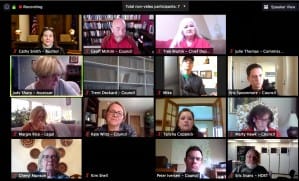Monroe County imposes hiring freeze, assessor says half of all assessed property value could vanish due to COVID-19 “disaster” claims

At the county council’s work session held Tuesday night, Monroe County assessor Judy Sharp sketched out one possible dire impact of the COVID-19 pandemic: Half the assessed value of property in the county could disappear.

The assessed value is the figure on which city, county, school and other property taxes are computed.
Sharp encouraged the council to pass the resolution on their agenda imposing a hiring freeze until July 1 of this year. The council approved the measure on a unanimous vote.
“It’s scary,” said Sharp, saying she’s never seen anything like it in her 35 years of experience. Sharp said she does not think the kind of disaster claims she’s expecting are applicable to a pandemic.
But based on the thousands of clients she hears that tax firms are lining up, she thinks the one claim she’s received so far, and denied, will soon turn into a deluge for her office.
The one disaster claim she’s received and denied so far was on behalf of the Hampton Inn property. The request was to drop the assessed value from $8 million to $5.5 million, Sharp said.
The impact of the COVID-19 pandemic on hotels was the specific focus of a separate report heard by the county council at its Tuesday work session. Mike Campbell, associate director of the Indiana Memorial Union and member of the convention and visitors commission, gave the county council a sketch of some projections for revenues from the innkeeper’s tax.
The 5-percent innkeeper’s tax is the revenue source for the convention center’s quarterly debt payments of $159,000.
The monthly revenues for the innkeeper’s tax average around $225,000 a month. Last year the total proceeds from the tax were $2.77 million. Based on the monthly projections presented by Campbell, the total revenue for 2020 could be around $1.7 million, a $1 million shortfall compared to last year.
The projected numbers that he showed the county council will still cover the debt payments, plus payroll and utilities through the end of this year for Downtown Bloomington, Inc. and Visit Bloomington, Campbell said.
Even though revenue from the innkeeper’s tax is down, it has not just stopped. Mike McAfee, executive director of Visit Bloomington, gave the the council a rundown of the latest numbers in the hotel report that he receives. McAfee said Monroe County is selling 400 to 500 room nights per night—that’s about 20-25 percent occupancy, he said. Nightly, there’s also about 50 short-term rentals (Airbnb), McAfee said.
For the week of April 18, the average rate was down 33 percent. Normally, the average room rate is about $110, but rooms have been going for $60 to $70, McAfee said. Room nights sold were down 66 percent for the week.
The latest 28-day demand report shows room nights sold are down 70 percent and room revenue is down 79 percent, McAfee said.
County assessor Judy Sharp said she doesn’t disagree that the Hampton Inn has had to close down for two months and it might have to remain closed a few more months. But she does not think that the disaster relief, under which the request for reduced assessment was made, is applicable to a situation like the COVID-19 pandemic.
Sharp said the disaster relief application form (Form 137) is designed for events like tornadoes. When a tornado went through the north part of Monroe County in 2019, Sharp said, she was able to take 40 destroyed houses off the tax rolls immediately. “That what we do, and that’s what we’re supposed to do,” Sharp said.
As for the impact of COVID-19 on the real estate market, Sharp said “There’s nothing wrong with our market,” adding that property is still selling well, even if maybe not quite as fast.
Sharp said the following day she’d be sending out the notice of assessment of land and improvements (Form 11) to taxpayers throughout the county. She thinks that will trigger a flood of applications for Form 137 disaster relief. She thinks the legislature or the state’s supreme court might eventually get involved in a way that results in a loss of 50 percent of the assessed value of all property in the county.
The resolution imposing a hiring freeze was not controversial among the county councilors. One concern they had, which was allayed, was that the county clerk should still be able to recruit election workers for the June 2 primary.
Indiana University currently has a hiring freeze in place. The state of Indiana has also imposed a hiring freeze.




Comments ()